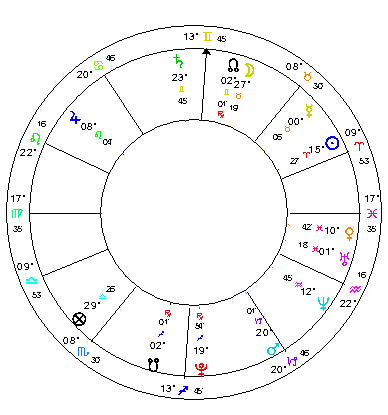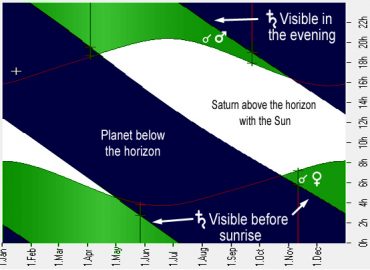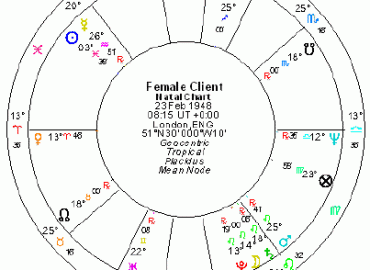(Hamlet, Act 2 Sc.II)
Darrelyn Gunzburg
July 2005
Recently I was asked to read the chart of a little girl. “Denise” had just turned two and was storming her way into self-determination. Denise’s parents booked in for a consultation as they were having trouble disciplining her. Indeed she was described by her father as “a spirited girl who is very feisty and wilful. She knows her own mind and has a tendency to rush at things a little. She is very quick on the uptake has a good memory, loads of energy, loves a thrill and insistent on trying to do everything she can do for herself.” Hence one might want to rush immediately to look either at her Mars (anger) or her Saturn (problems with authority). However, it has been found that children at this age can experience great frustration through a lack of communication skills. [1]

With this in mind, my approach was to unpack her Mercury, not only its sign, its aspects and its natal house position but also the ancient myths on which it stood. All of this in any chart will give insights into the person’s intellect and the way they express themselves.
As can be seen in the chart, Denise has Mercury in Taurus ruling the MC and Ascendant sextile Uranus ruling the 6th house. This aspect suggests people see her as (Mercury ruling the Asc) a fast-thinking, fast-talking individual (Mercury-Uranus) who is able to ground (Mercury in Taurus) her innovative ideas into useable data through research (Mercury in the 8th house) and hard work (Uranus in the 6th house and ruling the 6th). From this she is able to create opportunities (yin element sextile) to work with other people’s resources (8th house) in her daily work (6th house); and since Uranus is at The Bends (square the nodal axis), her unusual and pioneering ideas may well form part of her profession.
But underneath this potentially brilliant Mercury with all its communication skills are two wonderful ancient sky stories captured by the brightest star in the sky, Sirius, and the star linked with creativity, Acubens, the major star of Cancer. To quote Starlight:
Sirius on the Nadir as Mercury is rising.
Skilled with language or ideas
Sirius is one of the great stars of the sky. The Egyptians called it the Great Shining One or The Scorcher and it was linked with the rising, life-giving waters of the Nile. The impact of Sirius can either be severe, blistering an individual and leaving them burnt out; or else it can bring fame and glory. Thus in Denise’s future are novel ideas, innovative business dealings and the potential to influence many, many people.
Thus one of the foundation stone’s underpinning Denise’s life is this clever, bright, innovative mind struggling to express itself through the mouth and word-power of a two-year old child.
Added to this Denise also has Acubens culminating as Mercury is setting. Starlight says of this star-planet combination:
To have an interest in the ways of life; to explore how
life works socially, or physically

Acubens, the Scarab Beetle, is linked with the energy of life-giving and the concept of resurrection or, as we might interpret it, since it is connected with Mercury in Denise’s 8th house, the idea of change. Now we see that as Denise reaches past her Saturn Return, so her ideas take mature shape and start to be focused into the nature of people and animals: how they think, what they do, how they act. For Denise, it would seem that as she matured and found her voice, so she finds a purpose and application for her ground-breaking ideas and can, in some way, revolutionize or change things for people or animals.
Denise’s parents had finally resorted to using the “time out in the bedroom” method to control what they saw as Denise’s “vicious temper”. Perhaps what we may be seeing is The Scorcher, stymied and frustrated by its lack of vocabulary, expressing itself in burning rage. One wants Denise to be able to harness Sirius connected with her Mercury-Uranus so that her thinking and her ideas make an impact on other people, rather than have it destroy her.
I suggested to Denise’s parents that an alternate method might be to feed and stimulate Denise’s sharp and clever mind through, for example, teaching her to sign (see Joseph Garcia’s method mentioned above) so that she had better ways of communicating exactly how she was feeling and what were her needs. This then has the effect of empowering her communication so that, even at this young age, she begins to express herself and her ideas with confidence. Then as she matures, she can harness real life experience and thus connect it with her expressive capacity to make a difference (Mercury with Acubens).
As astrologers we can be seduced into believing that behaviour is manifest in only one planet of a chart, for example, anger and temper equals Mars. Such a simple example shows us that by broadening our search for the seed of the child’s frustration via planets and stars, we can be of far greater service to the client in helping them to guide their child in self-expression. In this case anger and temper equals Mercury-Uranus-Sirius-Acubens, a more complex arrangement reflecting the nature and scope of Denise’s Mercury and giving great understanding of where and how it was pulling her through time. It can even give insights into the style of schooling and education that she will need which can be of the greatest help to her for her future.
[1] Garcia, Joseph (2002). Sign with Your Baby: How to Communicate with Infants Before They Can Speak. Seattle: Northlight Communications. We are led to believe that children learn language quickly. The truth is that whilst babies are in a state of rapidly absorbing the world around them, it takes at least three-to-four years for a child to be able to participate in a continual conversation and to be almost completely intelligible. Hence one of the difficulties confronting children of around two years old is that their developing language does not match their growing comprehension of the world, as research carried out by Joseph Garcia has shown. So what might appear as defiance or naughtiness may simply be frustration at being unable to express personal need.




